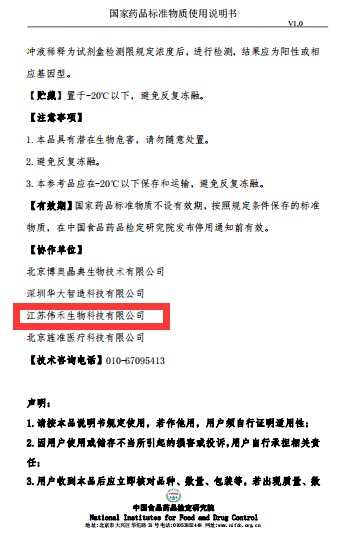

 Now Location:Home--News Center--Company News
Now Location:Home--News Center--Company News
Xi Da Pu Ben, Xi Da Pu Ben!!!
Recently, the China Academy of Food and Drug Control released the standards for the national reference materials for human leukocyte antigen B27 nucleic acid testing and human leukocyte antigen B5801/5701/1502 nucleic acid testing. This is the first time that the above-mentioned antigen reference standards have been publicly released, and Weihe Biotechnology, as a representative of fluorescence quantitative PCR method, has been commissioned by the China Academy of Food and Drug Control to jointly participate in the standard formulation of this reference standard. Other collaborative units include Beijing Boao Jingdian Biotechnology Co., Ltd., Shenzhen Huada Zhizao Technology Co., Ltd., and Beijing Jingzhun Medical Technology Co., Ltd. The instructions for the use of relevant national drug standard substances are as follows:







1. What is HLA
HLA (human leukocyte antigen), also known as human leukocyte antigen, is a highly polymorphic complex expressed by a series of closely linked gene loci. HLA is a human biological "ID card" that can recognize self and non self, and eliminate non self through immune reactions, thereby maintaining individual integrity. The susceptibility of different individuals to diseases is largely determined by genetic factors. The current correlation between HLA and disease and treatment is summarized as follows:
2. HLA-B1502 and adverse drug reactions in neurological disorders
HLA-B1502 is mainly used as a medication guide to exclude adverse reactions of neurogenic drugs such as carbamazepine and phenytoin on the skin. It is a common first-line antiepileptic drug in clinical practice and is widely used in the fields of neurology and psychiatry. The common adverse reactions are rash, mostly papular erythema, and there are also cases of polymorphic erythema, Stevens Johnson syndrome/toxic epidermal necrolysis. To avoid adverse drug reactions, the CPIC guidelines stipulate that when taking carbamazepine, HLA-B * 15:02 and HLA-A * 31:01 loci must be tested to guide the clinical use of carbamazepine.
3. HLA-B5801 and adverse reactions to gout drugs
HLA-B5801 is a test item for patients with related diseases such as gout and hyperuricemia who take allopurinol. Allopurinol is an enzyme inhibitor that is prone to skin adverse reactions such as rashes, and is more common in severe drug rashes. Therefore, the CPIC guidelines stipulate that taking allopurinol requires testing for HLA-B * 5801, and carrying this site should avoid taking allopurinol to avoid adverse reactions.
4. HLA-B5701 and adverse reactions of AIDS drugs
HLA-B5701 is closely related to the use of abacavir in AIDS patients. Abacavir can reduce the viral load in AIDS patients, but about 4.3% of patients have hypersensitivity reaction (HSR). Therefore, in order to avoid such adverse reactions, it is necessary to conduct corresponding tests on HLA-B5701 site to intervene in advance, confirm whether they can take abacavir, and develop treatment plans.
5. HLA and disease correlation
The above loci are mostly adverse reactions between HLA and drugs, but HLA is also highly closely related to various diseases. The detection of HLA-B27 is closely related to ankylosing spondylitis, especially HLA-B27 * 02 and HLA-B27 * 04 are risk factors for the occurrence of ankylosing spondylitis. In addition, HLA is also associated with most autoimmune diseases, such as psoriasis and HLA-DQA1, Behcet's syndrome and HLA-B51, rheumatoid arthritis and HLA-DQB1, DPB1, narcolepsy and HLA-DQB1, type I diabetes and DQA1, multiple sclerosis and HLA-DRB1, which are risk factors of various diseases, should be paid attention to and tested. HLA is also closely related to bone marrow transplantation, organ transplantation, CAR-T cell therapy, etc. The correlation has been discussed multiple times in the previous text, and will not be repeated in this article.
Although Weihe is a young enterprise, it has been deeply involved in the HLA field for more than 20 years. It has a complete set of independently developed and stable HLA diagnostic reagents, all of which have obtained CE certification. As one of the few HLA Chinese production-oriented enterprises in China, it is equally competitive with imported leading enterprises in terms of products, and is not inferior. The designation of Weihe Biotechnology by the China Food and Drug Control Institute as the national reference for human leukocyte antigen B27 nucleic acid testing and human leukocyte antigen B5801/5701/1502 nucleic acid testing is a great affirmation of Weihe's years of dedication to the field of HLA diagnosis. Weihe will continue to forge ahead and work tirelessly to replace import monopolies in the future and achieve localization of HLA diagnosis.
